
Exposé Online
What's old
Exposé print issues (1993-2011)
- 1 (October 1993)
- 2 (February 1994)
- 3 (May 1994)
- 4 (August 1994)
- 5 (October 1994)
- 6 (March 1995)
- 7 (July 1995)
- 8 (November 1995)
- 9 (March 1996)
- 10 (August 1996)
- 11 (February 1997)
- 12 (May 1997)
- 13 (October 1997)
- 14 (February 1998)
- 15 (July 1998)
- 16 (January 1999)
- 17 (April 1999)
- 18 (November 1999)
- 19 (May 2000)
- 20 (October 2000)
- 21 (March 2001)
- 22 (July 2001)
- 23 (December 2001)
- 24 (April 2002)
- 25 (September 2002)
- 26 (February 2003)
- 27 (August 2003)
- 28 (December 2003)
- 29 (April 2004)
- 30 (September 2004)
- 31 (March 2005)
- 32 (September 2005)
- 33 (May 2006)
- 34 (March 2007)
- 35 (January 2008)
- 36 (October 2008)
- 37 (July 2009)
- 38 (July 2010)
- 39 (Summer 2011)
Features
From Coltrane to Kobaïa —
The Christian Vander Interview

The Place: The Glass Slipper, Vancouver BC
The Time: Saturday afternoon, April 22, 1995 before the Christian Vander Trio show that evening
Laurent Goldstein: Translator
by George Allen, Robert Pearson, Published 1995-11-01
GA: Is the emblem for Magma meant to depict a bird, say, or is it an abstract symbol?
When I created it, I never thought of a bird. I had an idea inside about a symbol or emblem, and just wrote it down on a piece of paper, sketched it. The idea at the beginning was something like the dress of the Egyptians. It was supposed to be like a piece of cloth or articulated metal sheets that would mold over the body, over the ribcage. It was to be similar to breastplate armor, but supple, not rigid.
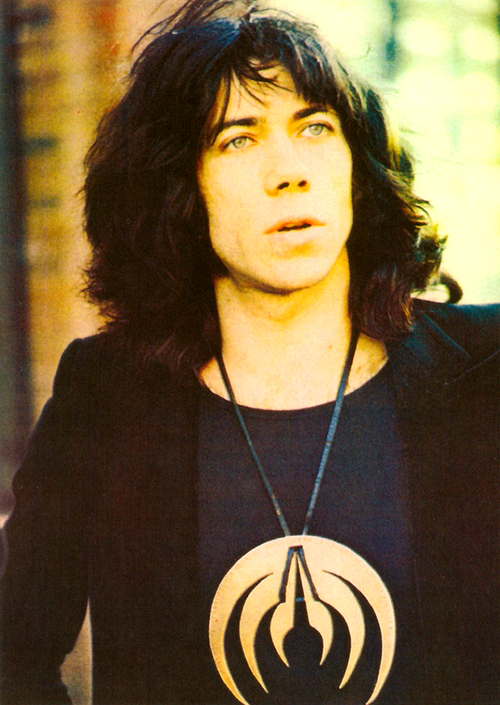 GA: The name Magma itself, is that part of Kobaïan, or does it refer to molten lava, and is it reflective of the style or material of the band?
GA: The name Magma itself, is that part of Kobaïan, or does it refer to molten lava, and is it reflective of the style or material of the band?
Yes, it refers directly to lava. Back in 1966, I had written a piece and I was already in a band with Bernard Paganotti, who became a bass player. Already, I was searching for the right word. The tune I wrote back then was called Nogma. I was looking for the word Magma, but didn't know it was what I was looking for. One day the band didn't have a name at the time, and they were standing in front of a fairly-well-known club in Paris. The club management told me If you dont have a name, you can't come and play tonight. So we went for coffee, at the coffee shop next door. I thought deeply, you know, and the word Magma, came out. At the same time, I founded Univeria Zekt. I wrote this down on the receipt from the coffee shop and kept it.
GA: Does the name Magma mean to reflect the qualities of flexibility and heat. Would those be adjectives or characteristics of your music that you value?
At the beginning, when I found the name, the name was bigger than me at the time, but it was inside of myself at the same time. I had to learn in time; I didnt know what it meant. And I kept on practicing to be at the same level as the name. And I am still practicing, to live up to the name and the evocation of the name.
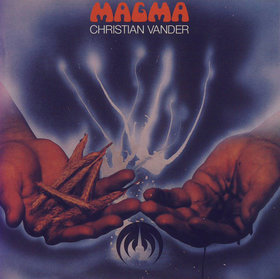 GA: Why did you give up the drums in some of the 80s materials where you only play piano, such as some of the Offering material and some of the Merci-era Magma?
GA: Why did you give up the drums in some of the 80s materials where you only play piano, such as some of the Offering material and some of the Merci-era Magma?
For Merci I only realized quite a while later that in fact I did not play on the record, because I was so involved in all the other parts from everybody and supervising everything that I didnt realize it. It was the first time that I really produced; we had a lot of problems in the studio before, we still do sometimes, and I learned a lot from it.
GA: (mumbling) Giorgio Gomelsky [sometimes producer of early Magma material]
That's another story.
GA: Are there any plans to do a 25th-year anniversary Magma reunion this year, or to record any more material under the name Magma?
Yes. I even have the name of the record. I have all the titles, but I haven't focused on the music yet. (laughter all around) When I woke up one day I wrote all the titles of the album down. If you repeat the titles in the right order, it sounds like a magic formula. It happens quite often that I dream the tunes, get up in the morning, and go on the piano, and write them down.
GA: Do some of the lyrics, then, come from unconscious states or dreams? For instance, automatic writing?
The music and the lyrics come up at the same time. If I am singing, and if it has to be in Kobaïan, they come up in Kobaïan. Sometimes there is a word that is maybe French or English and I leave it in because it is there, and its natural. The lyrics come at the same time, paralell to the music. For pieces like Mekanïk, they were not written in one shot or one session. I had to run a tape recorder to be able to capture it instantly - it goes very fast. I sing with new words that I don't know, and when I am improvising further, the same words come back, even though I don't know them. But I didn't learn them, they impose themselves on me.
GA: Will there be a reissue of the album Inedits?
Yes. I would like to find our original tapes. Because of the limitation of vinyl we had to cut material.
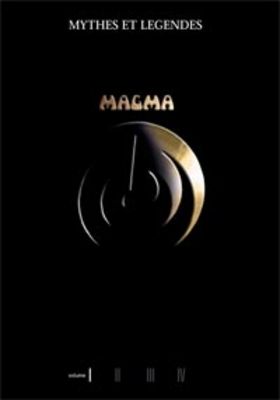 GA: Is there any plans to release either 1) a compilation of early Magma singles, or 2) Mythes et Légendes Vol. 2?
GA: Is there any plans to release either 1) a compilation of early Magma singles, or 2) Mythes et Légendes Vol. 2?
Yes, there will be a Mythes et Légendes Vol. 2. As for the singles, we don't have the original tapes.
RP: The gentleman who started the Magma mailing list on the Internet lives in Brazil and he wants to know if you ever intend to play in different countries such as Brazil or other parts of South America.
Why not?
RP: He said Brazil has an old tradition of percussion and has percussionists who are well-known around the world, such as Nana Vasconcelos. Do you know those artists?
Yeah, I know a lot of them, but don't always remember all the names; I have a problem with names.
GA: There was a book published in France, written in French, which explains the Kobaïan mythos, history, and language, I was told. Are there any plans for a translation from French into English?
About the book, it is important to know that the journalist who wrote the book - it's basically his book and its nothing bad but it's a lot of his own philosophy and its his book and also Klaus Blasquiz' book more than my book. I participated without really wanting to participate. At that time I did not really want to speak and just said a few things. Then the writer interpreted from that and the book is his own feelings about things.
RP: (Regarding the lyrics) Could you comment on how you feel they heal the human spirit, how healing they are?
Because they arise naturally. I feel that somehow they must be healing.
RP: There wasn't an intention to make healing music?
No, it happened naturally. If I created a word artificially, it would be different, but the words come up instinctively. I do not want to work artificially. I want to work from instinct. I have done everything to keep the instinct fresh and alive, quick, sharp.
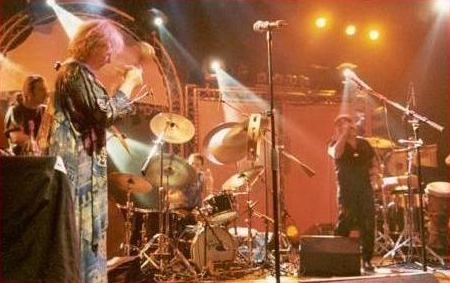 GA: It seems as if improvisation is a large part of your work, as a musician. Do you find a difference in the amount of freedom you have allowed yourself within the structure the the Christian Vander Trio and Offering, versus the freedom you allowed yourself and the other musicians in Magma?
GA: It seems as if improvisation is a large part of your work, as a musician. Do you find a difference in the amount of freedom you have allowed yourself within the structure the the Christian Vander Trio and Offering, versus the freedom you allowed yourself and the other musicians in Magma?
That's why Offering is called Offering and not Magma, obviously there is more improvisation in Offering than in Magma. We are always working a fine line. The feeling is to walk on a tightrope over a river, always walking on a tightrope. We improvise but we are on a tightrope. In Offering there is a very precise direction that we have to follow and we have to go from one place to the next. Within that space, within that journey, it's quite mysterious, and that's the charm of Offering. Also, another thing is important, I feel that the way life works, we never repeat the same things twice. Sometimes in Offering, I will explain clearly the harmony and the whole melody and everything and then once everybody knows that well, I say "It's good you know it well," because that's not the way were going to play it. "Purificatem" on A Fïïèh is a typical example of that. We had a very precise idea and sometimes the chords were complementing each other very well, but on the CD everything sounded like totally out like we didn't sound in and we still had to negotiate melodies and everything, within that. Which was initially what it was supposed to be but it didn't turn out the way it was, and they still had to negotiate within that. And we kept this take, because it is still mysterious how it worked. I hope one day to maybe have a theory to understand what happened.
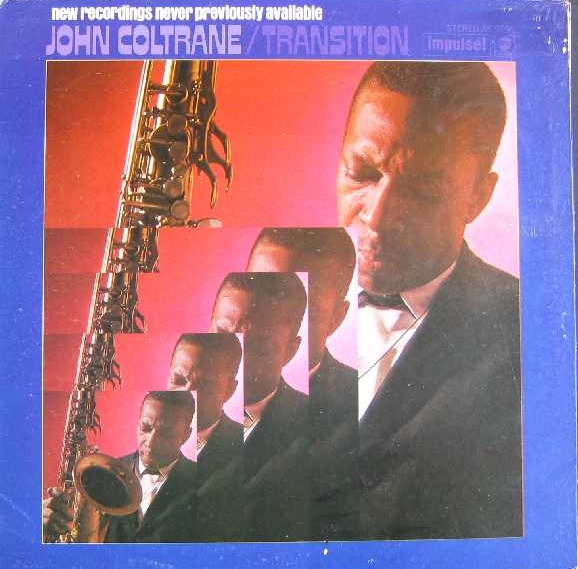 GA: The title of the latest Christian Vander Trio CD, 65, does that refer to John Coltrane's output in the year 1965?
GA: The title of the latest Christian Vander Trio CD, 65, does that refer to John Coltrane's output in the year 1965?
Yes.
GA: Is that a favorite period of Coltrane's work?
For me, it was a key period, because the quartet was at its apogee and best, and it was a key, transitional period. It was a very important time, 1965. Coltrane already had his new ideas and his new plans within the music, but at the same time the quartet was still together. I refer to the music Coltrane wanted released, the real chronology of the Coltrane albums. That is, only the official Coltrane albums that he left behind, like Transition or Crescent. Sun Ship, for example, was not one he wanted to keep. I know the real chronology of all the albums, because I lived during that period.
GA: It's been reported that Coltrane's work has had an impact on you. Do other artists, such as Pharaoh Sanders, Archie Shepp, or Albert Ayler, for instance, hold a continuing interest for you?
I am always listening and attentive to what they do. I am open to listen to what they do. But for my work, it is still Coltrane who actually gives me the real material to work on, to be able to move on.
 GA: Can you talk about the influence of your father's (Maurice Vander) jazz piano playing on your music?
GA: Can you talk about the influence of your father's (Maurice Vander) jazz piano playing on your music?
In fact Maurice Vander is my step-father and the person who really opened up Maurice to jazz is my mother, who was very close to the jazz scene. She is the one who opened me up, at a very young age, to this world of jazz. She was lucky enough to know all the best jazz musicians at the time.
GA: What is your opinion of such bands as Eskaton, who draw very heavily on the sound and typical harmonies of Magma's work, or Ruins, the Japanese band?
Eskaton is not bad.
GA: Sun Ra and the Arkestra are a continuing set of musicians who operate much as a band, and they also have a mythic approach to outer space themes. Do you listen to or like Sun Ra?
I have not really listened to Sun Ra but every time I've heard Sun Ra I've felt that there was something, a real connection. What's funny is that before Magma the band already had a long name in mind, and it sounded very much like the whole long name of Sun Ra & The Arkestra.
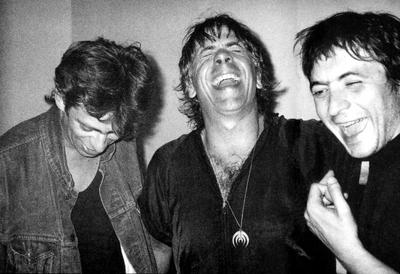 RP: What do you like to read?
RP: What do you like to read?
I am looking for the books that one cannot find in bookstores.
RP: Were you influenced by the Surrealists at all?
I can't speak of a real influence, but yes, I would read that more as a relaxation, but not a real influence.
RP: What are some spiritual influences that you could point to, like Gurdjieff or the Gospels?
It's difficult to answer because at different times in my life I have tried different philosophies but I dont think that Gurdjieff's teachings and the laws surrounding that teaching really apply today. It doesn't work for today.
RP: What works for today?
For example, the monks in Tibet they pray all the time for peace and they have been doing that for a very long time and what is happening is that there are less and less of them and they are less and less heard, so my question is: Are their prayers really working? Today the prayers are heard less and less and the world is going down and down. I think that I understand part of the things that do not work and I plan to write a philosophical book. The book will look like a novel. I already have 800 pages written.
Filed under: Interviews, Issue 8
Related artist(s): Magma, Christian Vander / Offering
What's new
These are the most recent changes made to artists, releases, and articles.
- Release: Thierry Zaboitzeff - Artefacts
Updated 2026-02-27 00:16:46 - Review: Kevin Kastning - Codex I & Codex II
Published 2026-02-27 - Release: Zan Zone - The Rock Is Still Rollin'
Updated 2026-02-26 23:26:09 - Release: The Leemoo Gang - A Family Business
Updated 2026-02-26 23:07:29 - Release: Ciolkowska - Bomba Nastoyashchego
Updated 2026-02-26 13:08:55 - Review: Immensity Crumb - Chamber Music for Sleeping Giants
Published 2026-02-26 - Release: The Gatekeepers - Diary of a Teenage Prophet
Updated 2026-02-25 15:55:58 - Review: Mars Lasar - Grand Canyon
Published 2026-02-25 - Listen and discover: Mordecai Smyth will not break your back
Published 2026-02-25 - Release: Tashi Wada - What Is Not Strange?
Updated 2026-02-24 14:56:16 - Artist: Tashi Wada
Updated 2026-02-24 14:54:34 - Release: Greg Segal - Maintain!
Updated 2026-02-24 00:38:03 - Review: Il Segno del Comando - Sublimazione - Live
Published 2026-02-24 - Review: Nektar - Mission to Mars & Fortyfied
Published 2026-02-23 - Review: Jaime Rosas - Tres Piezas de Rock Progresivo
Published 2026-02-22 - Release: Kevin Kastning & Bruno Råberg - Across Tall Rain
Updated 2026-02-21 00:42:08 - Review: Gary Husband - Postcards from the Past
Published 2026-02-21 - Release: Daniel Crommie - Februa
Updated 2026-02-20 14:23:17
